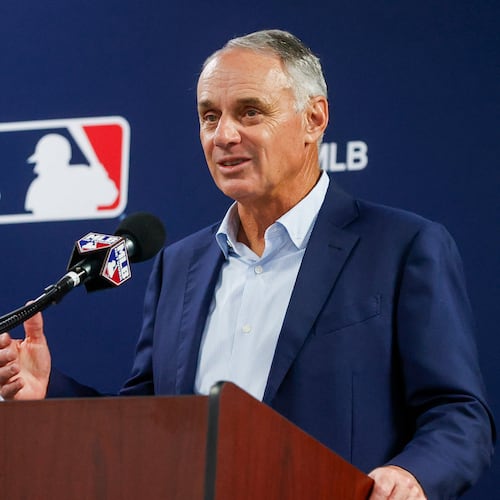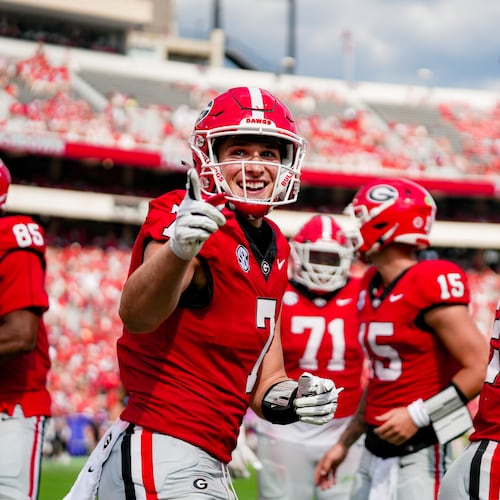ATHENS — The Georgia-Florida game will remain in Jacksonville for at least three more years. The question, now, is what will happen beyond that.
Thanks to the contract extension the two schools signed with the city of Jacksonville last spring, we know the game that fans call “The World’s Largest Cocktail Party” will continue to be played on the “First Coast” through the fall of 2025. After that, though, everything is up in the air.
The hope in Jacksonville is a plan for a multi-million-dollar renovation of the stadium currently known as EverBank Stadium gets finalized in the coming months. If it does, then the facility the Jacksonville Jaguars call home won’t be available for a two-year period in 2026-27. That’s for the Jaguars, as well as Georgia-Florida and the Gator Bowl.
If that comes to pass as expected, then it will be up to the respective universities as to where they play their game those two seasons. Technically, it’s not official that Georgia and Florida will continue to play annually after SEC expansion adds Oklahoma and Texas next year. However, it is well known throughout the league that both the Bulldogs and Gators have designated their rivalry No. 1 with the league office for the future SEC schedule-model consideration. That has yet to be released.
At issue, then, is what Florida and Georgia do with their game in the interim. The easy solution is to simply go home-and-home those two seasons. That’s something Bulldogs coach Kirby Smart certainly would like. That would bring the Gators to Sanford Stadium in 2026 and take Georgia to Ben Hill Griffin Stadium – aka “The Swamp” – in 2027.
The problem with that solution is it would create a budget shortfall of at least $6 million for both schools over those two years. Their new agreement with Jacksonville nets each school about $4.5 million a year, or $9 million over two seasons. A typical home-and-home arrangement nets the teams about $2.5 million over the same period.
One solution being discussed is playing the game at neutral sites during the 2026-27 seasons. For Georgia, which is the home team in 2026, that could be Mercedes-Benz Stadium. For Florida, that could be Orlando’s Camping World Stadium or Tampa’s Raymond James Stadium.
Another possibility is the respective schools simply charging higher ticket prices for Georgia-Florida home games. But school officials are withholding comment at the moment.
Whatever the case, it won’t be resolved before Saturday. Here are five more pertinent issues heading into Saturday’s game (3:30 p.m., CBS) between top-ranked Georgia (7-0, 4-0 SEC) and unranked Florida (5-2, 3-1):
Life after Brock
The most notable development before this year’s game was Georgia losing tight end Brock Bowers to an ankle injury in its most recent game two weeks ago against Vanderbilt. The two-time All-American underwent TightRope surgery to repair the high-ankle sprain Oct. 16 and likely will be sidelined for the remainder of the regular season.
To date, Bowers has accounted for 16.7% of the Bulldogs’ offensive production this season, and that’s while playing only the first halves of two of the seven games. So, his 595 all-purpose yards and five touchdowns will be missed.
It seems unlikely that Georgia simply would transfer Bowers’ average of roughly 10 touches/targets to his replacement, sophomore tight end Oscar Delp. More likely is those opportunities will be spread out among the Bulldogs’ skill players, which include receivers, running backs and tight ends.
“Brock is a big piece of our team, but all of us are saying everybody’s got to go 5% harder to make up for the loss,” junior slot receiver Dominic Lovett said. “Football’s not played by one person, even though Brock Bowers is a big piece. That just means everybody’s got to step up.”
Beck’s homecoming
Carson Beck had played incredibly well for the Bulldogs in his first season as the starting quarterback. But even coach Kirby Smart said no one can be sure how the fourth-year junior will react to playing the season’s most meaningful game to date in his hometown.
Beck grew up in Jacksonville and starred for Mandarin High School, which located 18 miles away from EverBank Stadium.
“He’s been a little bit more energetic at practice,” junior guard Tate Ratledge said. “I think he’s really looking forward to this game, getting to go back to his hometown and play. I know it’s a big game for him, and I’m excited to see what he can do.”
Beck has been exceptional so far. In seven games, the 6-foot-4, 220-pound quarterback is on pace to break the school’s single-season record for completion percentage. He has completed 73.4% of his passes for 2,147 yards and 12 touchdowns with four interceptions.
Averaging 40.1 points and 509.4 yards per game, the Bulldogs are on almost the same offensive pace of 40.1 points and 501.1 yards that they established under Stetson Bennett last season on the way to a 15-0 record.
New-look Gators offense
The only SEC quarterback playing better Beck, statistically at least, is Florida’s Graham Mertz. The graduate transfer from Wisconsin enters Saturday’s game leading the league with a 76.2 completion percentage while passing for 1,897 yards and 12 touchdowns and throwing only two interceptions.
Mertz was at his best the last time out when he recorded the first 400-yard passing game of his career in a come-from-behind road win over South Carolina. Mertz engineered a pair of 75-yard fourth-quarter scoring drives that resulted in two of his three touchdowns passes in a 41-39 victory.
It’s not all passing for the Gators, however. Their offensive success is based on a ground game powered by a combined 130 yards rushing per game from running backs Trevor Etienne (67.8 ypg) and Montrell Johnson (62.6).
Georgia-favored defense
Florida’s defense has been markedly improved under the direction of first-year coordinator Austin Armstrong. The 30-year-old Armstrong was a defensive analyst at Georgia in 2019 before joining Florida coach Billy Napier at Louisiana-Lafayette as a linebackers coach in 2020. He coordinated the defense at Southern Miss in 2021-22 before rejoining Napier and the Gators in January. At the time, he had accepted a job offer from Nick Saban as linebackers coach at Alabama.
So far, that looks like a great hire for Napier. Florida is allowing 8.9 fewer points (20.0) and 117 yards less (312.3) per game than it did a year ago.
Even though it is relatively down from the national-championship of 2021 and 2022, Georgia continues to set the bar in the SEC when it comes to defense. The Bulldogs lead the league, as usual in yards (262.6 pg) and points allowed (14.0 pg).
Right tackle watch
All eyes Saturday will be on Georgia’s right-tackle position to see who lines up with the first-team offense. That could be senior Xavier Truss, who has started the past four games but is coming off an ankle sprain in the most-recent game; Amarius Mims, a junior and preseason All-American candidate who is five weeks removed from TightRope surgery to repair his left ankle; or Monroe Freeling, a freshman who finished the Vanderbilt game after Truss was sidelined midway through the second quarter.
Smart has pronounced Truss fit to play Saturday. Meanwhile, Mims returned to the practice fields this week and was, of course, the starter for a reason.
Smart would say only, “it’s who gives us the best chance to win.”
About the Author
Keep Reading
The Latest
Featured



